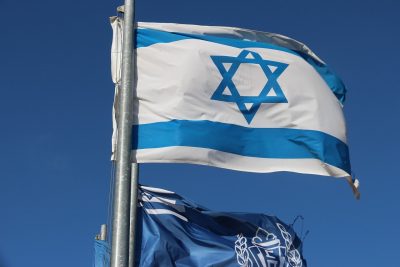×


We have detected your country as:
Please click here to go to the USA website or select another country from the dropdown list.
 War veterans suffering post-traumatic stress in the US; farmers in Senegal, India, and China; young women in South Sudan; the wheelchair-bound in Africa; cardiac patients in Gaza and Iraq—all have received life-changing help and expertise from Israeli specialists.
War veterans suffering post-traumatic stress in the US; farmers in Senegal, India, and China; young women in South Sudan; the wheelchair-bound in Africa; cardiac patients in Gaza and Iraq—all have received life-changing help and expertise from Israeli specialists.
Since Israel was founded in 1948, the country has set itself the goal of being a light unto the nations, sharing its creative solutions with the rest of the developing world. To celebrate Israel’s 65th birthday, ISRAEL21c has compiled a list of 65 ways Israel is helping to enrich and improve our planet. We only have room on these pages for a partial list, but you can visit the website at the end of this article to see all sixty-five.
1. Treatment of thousands of children suffering radiation sickness caused by the Ukrainian nuclear disaster in Chernobyl over 27 years ago.
2. Israel set up the most advanced and well-equipped field hospital in Haiti. When a devastating earthquake hit the country, Israel responded with speed and expertise, sending a team of 240 Israeli doctors, nurses, rescue and relief workers.
3. A range of humanitarian projects around the world including a volunteer HIV/AIDS education and treatment program in Ethiopia and Kazakhstan; eye surgery for needy African patients; adult male circumcision for HIV prevention in Africa; and public health education in Kathmandu.
4. A field hospital and tons of aid to communities hardest hit when Japan was rocked by an earthquake and tsunami in March 2011.
5. Cardboard wheelchairs made entirely of cheap, recycled materials, providing free wheelchairs for the disabled in developing nations.
6. Vital heart operations provided at an Israeli hospital for more than 3,000 children from all over the developing world, including about 1,500 from Gaza and the West Bank [Judea and Samaria].
7. Drip irrigation has completely revolutionized agriculture across the world, enabling farmers to increase their yields with less water.
8. A toilet that needs no water, generating its own power to turn solid waste into sterile and odorless fertilizer in 30 seconds.
9. Plastic trays that collect dew from the air, and reduce the water needed by crops or trees by up to 50 percent. The trays surround each plant or tree, and funnel collected dew and condensation straight to the roots. If it rains, the trays heighten the effect of each millimeter of water 27 times over.
10. A water purification system that delivers safe drinking water from almost any source, including contaminated water, seawater, and even urine, has been developed in Israel.
11. An artificial desert oasis that could help feed millions of desert-dwellers. The oasis uses low-cost desalination technology that runs on solar power to turn brackish water into sweet water.
12. An alternative seed treatment that could revolutionize farming, protecting vegetable seeds from infestation, fungus, bacteria and even drought, without the side effects of genetic engineering (GMO).
13. Free cataract removal operations by Israeli eye doctors in Vietnam, China, Myanmar, the Maldives, and even Muslim countries including Azerbaijan, giving the gift of sight back to many people blind in one or both eyes.
14. A way to raise saltwater fish anywhere, even in the desert, without any of the usual problems associated with pollution found in seawater.
15. Israeli experts helped revive old languages, such as the Lapp language of Sámi in Norway, and minority languages in Scotland and Wales.
16. Developed a simple mobile-phone imaging system to diagnose and monitor malaria.
17. Groundbreaking medical contributions made toward the eradication of common parasitic infestations that contribute to Africa’s AIDS and tuberculosis epidemics.
18. A new solar window that can generate power, reduce energy consumption, and let in daylight, promising a green revolution in the construction industry.
19. A field hospital along Israel’s border with Syria to treat Syrians wounded in the country’s bloody civil war.
20. Israel provides a yearly trauma-care training course for participants from Africa, South America, and the Far East.
21. Two new neonatal units in Kumasi, the second largest city in Ghana. Of the 28,000 babies born in the city every year, some 4,800 died. Israeli specialists are now training local doctors and nurses to help save infants’ lives.
22. The first nation to offer assistance to Turkey in the aftermath of a massive 7.2 magnitude earthquake in October 2011.
23. Groundbreaking special-needs services to help the disabled, including hydrotherapy, multisensory rooms, and inclusive playgrounds.
24. Solar-powered light fixtures on African and South American roads. The environmentally-friendly light fixtures do not rely on electricity infrastructures, need maintenance once every three years, and can be used in any climate.
25. A technology which detects foreign object debris on airport runways—such as birds, small animals, and fragments that break off planes thereby preventing crashes and other damage caused by foreign object debris.
26. The breeding of beneficial insects for biological pest control, which enable farmers to reduce the use of chemical pesticides by 75 percent.
Photo Credit: Mabatel/pixabay.com
Source: (Excerpts of an article by Nicky Blackburn, israel21c.org)
All logos and trademarks in this site are property of their respective owner. All other materials are property of Bridges for Peace. Copyright © 2025.
Website Site Design by J-Town Internet Services Ltd. - Based in Jerusalem and Serving the World.